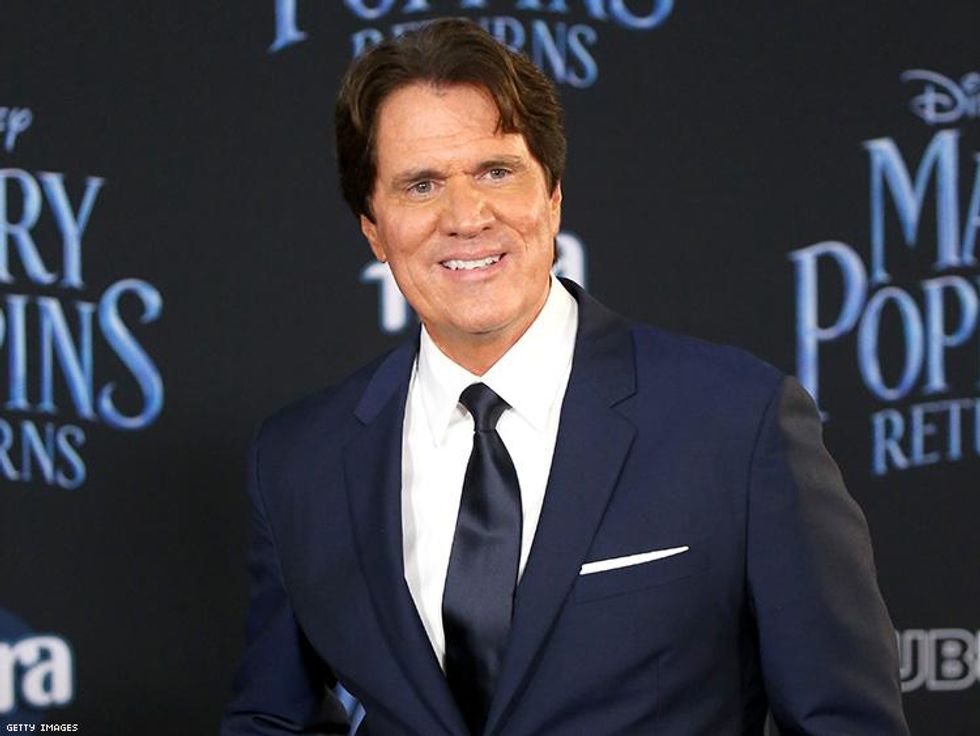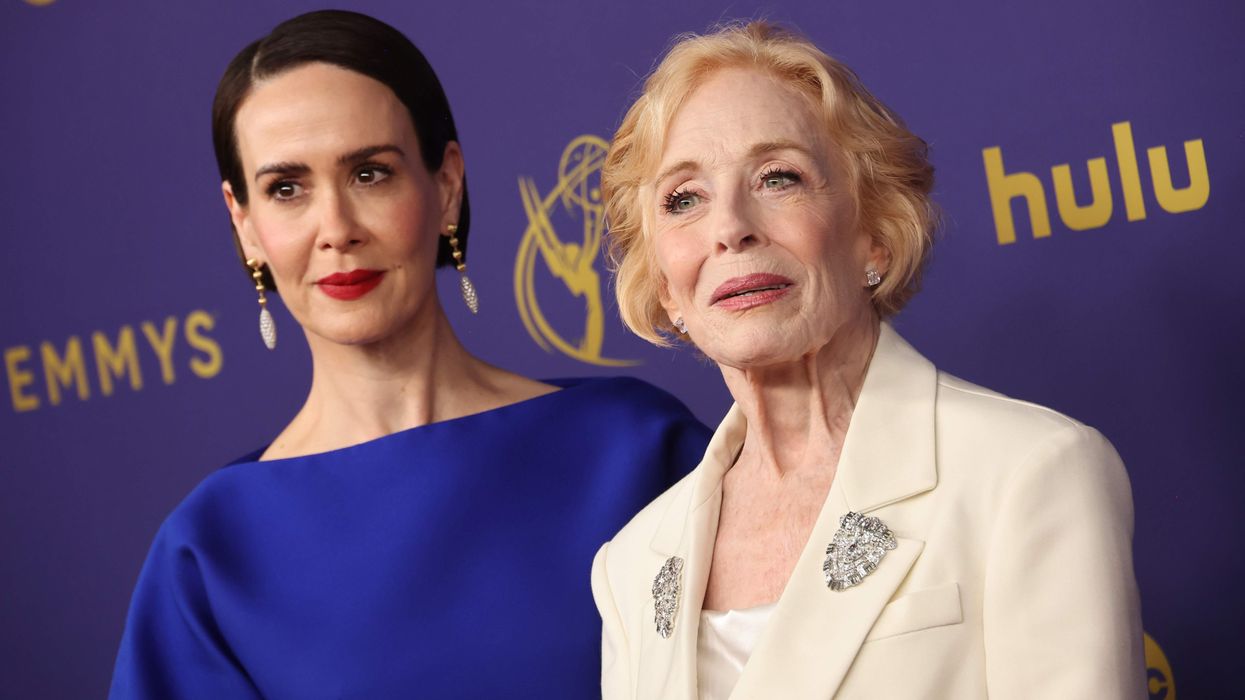The future of Mary Poppins is queer -- or at least, that's what the gay director of Mary Poppins Returns, Rob Marshall, hopes it will be.
At a recent press event at Disney Studios -- where Angela Lansbury made a surprise appearance -- the gay director (Chicago, Into the Woods) sat down with The Advocate to discuss the role of social movements in the fantastical films.
[RELATED: Does Angela Lansbury Want a 'Bedknobs & Broomsticks' Remake?]
The original 1964 movie starring Julie Andrews as the magical British nanny depicted the mother of the family she assists, Winifred Banks (Glynis Johns), as a member of the women's suffrage movement in 1910. In Mary Poppins Returns, Winifred's daughter, Jane (Emily Mortimer), is a labor organizer.
This was no coincidence. It "was a conscious decision to have [Jane] follow in the footsteps of her mother," affirmed Marshall, who did not hesitate to include activist causes in a children's movie. "I never approached it like, Oh, I'm making a film for kids. It's that great thing that Walt Disney said, 'Our films aren't for children. They're for the child in all of us.' Which is such a great quote and it's so true. But this one, I honestly felt was for adults."
"I wanted to root it in a real place," he said of his sequel. "That's why Jane works for the rights of workers. This is the '30s, the Depression era when it was the great slump. There was a sadness in the world and [Mary Poppins] needs to come back."
This feeling of sadness reflects the zeitgeist of today, said Marshall, whose intention was "to create a profound film that deals with loss." And if Mary Poppins were to return again, he would hope that Annabel, John, and Georgie -- or another generation of Bankses -- would have grown up to engage with the modern-day social movement of LGBTQ rights.
"Our movie takes place in the '30s. But if it were to take place now, that's exactly what it should be," Marshall said. "I understand so deeply what it's like to be on the outskirts and not feel like you are worthy. And I will say that kind of passion to explore acceptance in life is something that's so important."
Mary Poppins Returns was released digitally and on Blu-ray this week -- and these versions also include "The Practically Perfect Making of Mary Poppins Returns," a short that shows the special effects used to create many of the fantastical scenes in the movie. Read the full Q&A with Marshall below, where in addition to discussing social movements and the evolution of the movie musical, he delves into the movie magic of these scenes.
The Advocate: This isn't just a CGI film or a bunch of actors in front of a green screen. We're really seeing this old-school movie magic. Can you talk about the scene of the bathtub that went viral where Emily Blunt goes backwards into the tub and down the slide?
Rob Marshall: I like to do things as real as possible if I can, because I think you feel it. I watch films and I feel so disengaged when I don't believe it. It doesn't feel somehow tangible and I wanted to do as much as we could practically. And I had this incredible team of people to help me do that. There are two phrases. There's "special effects" and then there's "visual effects." "Special effects" is when you do things practically.
I never even thought about doing that in a way [with] a green screen. I thought, Well, how can we do this? How can they dive into this tub? You know? And they came up with this idea of putting the whole set up on a second story [so] they could pull, literally, the bottom out of the tub and put a slide in. I mean, we had two tubs. We had the tub that we used when the water's on and so forth. And then we would take it out. We got to the moment where they were going to slide, folded it out, they take the bottom out of it. They insert the slide that goes down a full story, and then instead of water, there's just bubbles. It was so fun. If you watch the film, I can see the kids so excited. Especially, I think the take we used was the first time. They were so excited to slide down. And Emily [Blunt] was petrified, but because she's going in backwards. I mean, it's so much harder, because you're blind. And she said, "Rob, please can we just only do this once!" I think we did it three times, but she's so game and she trusted. She knows it can be done. But I liked doing it like that. It's fun for everybody on the set, but I feel it in the film. I feel the excitement. It feels sort of laissez-faire.
Did you get to go down the slide?
I should have! You know, I realize I should have! What was wrong with me? I really should have. I was too busy. But I would love to have. Now I wish I had.
As the director of films like Chicago and Into the Woods, you've really played a huge role in bringing back movie musicals into the culture. And I'm curious, how do you think the role of the movie musical has changed? What does it mean today versus the mid-20th century? I ask this because -- similar to the way Mary Poppins shows up in times of hardship, I think people also turn to the movies and musicals for an escape.
I agree. I think musicals are needed in darker times because people need to remember there is joy in the world. There is wonder in the world. There is dance. There is song. It lifts you in a way that nothing else can. It really does. I return to musicals when I need that lift in my life. It's a beautiful way to live. And musicals, the golden era ... that came out of the Depression era. I really believe. That's where it flourished through the war, post-war too. There was a machine there. Everyone did musicals and they just did musical after musical and they would create musicals for specific talent, for Fred Astaire, for Gene Kelly, for Judy Garland. That's what they would do, create these musicals for them, for their talent. And ours are few and far between. When I did Chicago, it was so not in fashion. I remember people saying, 'No one's going to see this.' And I was like, 'I know, no one's gonna see it!' Because musicals were just so not accepted at that point. Animated musicals were, but not live-action musicals. But I never believed the genre was dead. I always believed that it's how you do it and if you can do it in the right way. And so I've been thrilled to see since Chicago -- and Moulin Rouge! also, which was just before us -- it opened the door to more musicals. You feel that musicals are happening and I couldn't be happier. It's still not the golden age where it's like 20 musicals a year. It's like two or three. But they've sort of been rejuvenated. And I'm incredibly happy about that. It's our genre. It's an American genre.
I would also not exactly call Mary Poppins escapist. Because I think the brilliance of Mary Poppins is, she makes you confront things that are hard. Your film also continues this tradition of addressing movements of social change. So we saw women's suffrage in the first film, and then we see workers' rights in this one. And I'm curious why it was important for you to address that social movement in a film that is for kids.
Because I think it's for the child in all of us, not kids. I mean, I honestly feel it's almost more important for adults, this film. Because I think adults forget, as Angela Lansbury says at the end of the film, when she comes to Mary Poppins and everyone's up on balloons, and she says, well, the adults will forget by tomorrow. And then Mary Poppins says, they always do. That to me is a crime in life to forget all of those things. And I think adults need to be reminded. I couldn't have been happier when adults would come out of the [film and say], "I felt like I was a child again." That's the whole point of the film. So I think for me, this isn't just light fare.
 (Pictured: Rob Marshall)
(Pictured: Rob Marshall)
My intention was to create a profound film that deals with loss, that deals with not only loss of one's mother or wife, a family member, but also deals with the loss of wonder and joy in one's life and can't recover that again and find that again. And so, looking for that again. I wanted to root it in a real place. That's why Jane works for the rights of workers. This is the '30s, the Depression era when it was the great slump. There was a sadness in the world and [Mary Poppins] needs to come back. We had to come up with a real reason for her to come back. I feel like that time of the Depression era reflects our time now, in a way. People need to be reminded. They need to remember. You wake up to the most horrific news every day and you're looking for a way to move forward in life. And how do you do that? It's how you perceive things. From what angle? Can you see the beauty and joy in life and can you find that? Otherwise, it's just a dark life. That's how I choose to live personally. It was a very personal film for me for that reason.
How interesting that it was the women in both films that fight for causes.
You're right about that. That was a conscious decision to have [Jane] follow in the footsteps of her mother. I will say, I never approached it like, Oh, I'm making a film for kids. It's that great thing that Walt Disney said, "Our films aren't for children. They're for the child in all of us." Which is such a great quote and it's so true. But this one, I honestly felt was for adults.
Do you see the next generation to advocating for causes like gay rights, LGBTQ rights?
Wouldn't that'd be great? Please, Lord. That's exactly what should be happening. I'm always so aware of that, being a gay man myself. I mean, our movie takes place in the '30s. But if it were to take place now, that's exactly what it should be. I understand so deeply what it's like to be on the outskirts and not feel like you are worthy. And I will say that kind of passion to explore acceptance in life is something that's so important. And so, yes, I'd be all for that, for sure.
Mary Poppins Returns is now available on home entertainment release. Watch the trailer below.


 (Pictured: Rob Marshall)
(Pictured: Rob Marshall)

































































Charlie Kirk DID say stoning gay people was the 'perfect law' — and these other heinous quotes